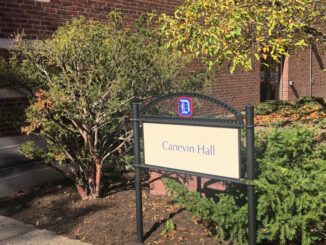
By: Rebekah Devorak | Opinions Editor
This is an editorial piece, and the views of the writer in no way reflect the views of The Duquesne Duke, its staff, or Duquesne University.
We’ve all heard the same spiel.
Chances are, you were on the receiving end of it at some point this past Labor Day weekend, as you gathered with extended family around a grill or by a pool. But the question is always the same:
“What exactly are you going to do with that liberal arts degree?”
Cue the tight, toothless smile, prickling of panic within your chest and rehearsed explanation of future plans.
It’s true that pretty much every student feels the pressure of appeasing inquiring minds about what they are going to do upon graduation, but it also seems to be true that those pursuing creative majors are forced to explain why their years of schooling have been worthwhile much more often than others. And that’s not exactly fair.
After all, no one really asks law students about how they plan on making that piece of paper useful.
A recent opinions article on Philly.com touched on this troubling point of view. It discussed the idea of allowing this nation’s government to choose a person’s major if he or she is going to use taxpayer dollars to foot the bill of higher education. While that is an entirely separate issue for another time, the piece basically summed up liberal arts majors as a waste of time and money because they do not produce as many valuable benefits for society.
The article pointed out that “we simply do not need more poetry, gender studies or sociology majors. Starbucks is fully stocked with baristas for the foreseeable future.” Instead, it urged prospective students to look into becoming nurses and statisticians, who will make nearly $20,000 more annually than elementary school teachers and criminal justice workers.
It’s true that liberal arts majors probably won’t make a lot of money. According to the National Association of Colleges and Employers, the average starting salary for a variety of different areas in 2015, including history and English, hovered right around the $35,000 range.
Sadly, many people only seem to base their idea of professional success upon money these days. They haven’t “made it” if they haven’t raked in enough cash with which to fill a couple of yachts, an Olympic-sized swimming pool and a vacation home in Martha’s Vineyard.
Now, I’m not saying money isn’t important, because it is. You will need some of it so that you can maintain a comfortable lifestyle. But we should not be quantifying the importance of one occupation versus another – essentially one person’s importance versus another – Michael Scott style, claiming that you and your passions are lesser because they are only worth so many dollars.
There are other notions of achievement that should be considered beyond the paycheck.
This may seem a little naïve, but what about a person’s happiness? Dedicating your time and energy into a field that makes you excited to wake up each day for work is not something that should be discounted or taken lightly, because joy seems to be such a rare concept today. A quick Google search shows that mental health issues such as depression, stress and anxiety are on a continuing rise.
Pursuing an occupation that you consider to be personally worthwhile, something that truly matters to you because it brings you bliss is never a waste of time, and we should not treat it condescendingly because it might not make as much bank.
And what about the impact these jobs have on the world? The footprints doctors and scientists leave on the globe are obvious. But have you ever thought about how if there are fewer poets and writers, then there will be fewer thought-provoking books to read and discuss in your leisure time?
That means fewer plays like “Hamilton,” as if trying to get tickets to that one wasn’t difficult enough.
Our education majors will go on to shape the young minds of this country for the future. We have to think seriously about the kind of message we want to be sending them. Will it be one focused on hunting economic prosperity above all else, or will it be one rooted in chasing dreams, no matter how unnecessary they may seem to society?
These are quite a few rhetorical questions, but one thing is clear. We need to stop harping on liberal arts majors for not being as overtly practical as other areas of study.
At the end of the day, practicality does not equal, nor reflect, a person’s worth.




